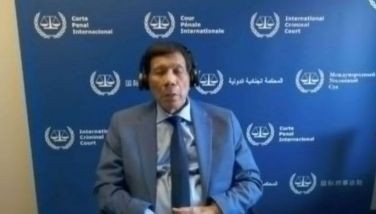Diving deeper into FPRRD’s arrest

It has been almost a month since former president Rodrigo Roa Duterte’s arrest and due to a high level of confusion, people are still asking if indeed this arrest was valid. A few days ago, I caught an interview with former Associate Justice of the Supreme Court Adolfo Azcuna, whose insights on the matter provided more context and clarity with regard to the issue at hand.
So many people continue to ask if the warrant issued to the former president was indeed valid and legal and if its execution by Philippine authorities was equally valid and legal, as well as his subsequent transfer to the International Criminal Court. The former associate justice explained that the warrant of arrest issued by the ICC was issued pursuant to its jurisdiction over crimes against humanity which were committed in the Philippines (where Duterte is charged with such crimes) and at the time when the country was party to the Rome Statute.
But the question always goes back to how a warrant of arrest can be issued if we are no longer a member of the ICC and if it is still possible to issue a warrant of arrest. Justice Azcuna explained that this was possible if it falls under Article 127 paragraph two of the Statute of Rome where it is indicated that even after withdrawal, the withdrawing state is obligated to cooperate with the ICC in relation to matters already under consideration by the court before withdrawal, hence also explaining our residual obligations.
But the way this warrant was enforced, however, is another matter to consider. The warrant was served through the Interpol, where this shows both the agreement (Interpol agreement) and that of the Rome Statute and its continued obligation under the statute (under Article 127), making the execution of the warrant of arrest valid as it was pursuant to treaty obligations which we are bound by.
This does not mean a surrender of sovereignty, which is also another pressing question in people’s minds. As explained by the good associate justice, the ICC will therefore balance irregularities of arrest with the need to pursue prosecution of the most serious offenses and, if the balance is in favor of prosecution, it will disregard irregularities in the arrest as long as the person is within their jurisdiction/turned over to their jurisdiction, where they will try and prosecute the person.
Again on the enforcement, the proper procedure, as explained by Justice Azcuna, the arrest of Duterte was based on the provisions of the Rome Statute and when asked if these were followed, Justice Azcuna said it was not since, under the Rome Statute (Article 59), what is required after serving the warrant of arrest is that the custodial state – in this case the Philippines – should bring the person arrested to a local court which will determine whether or not he or she is the person named in the warrant of arrest, whether or not the person arrested was informed of the nature of the charges and whether or not his or her rights were respected. These are the issues a local court must be able to determine before the arrest can culminate in a surrender.
But Azcuna says that according to other experts, this condition is no longer applicable as we are no longer party to Rome Statute, making the Article 59 procedure no longer a requirement. However, Justice Azcuna observed that in the March 14th hearing, the pre-trial chamber of the ICC did exactly what our local court SHOULD have done under Article 59 – meaning to say, it met the three conditions: whether he and in this case former president Duterte is the person named in the warrant, that the nature of the charges is clear and that his rights were respected. In the end, the pre-trial chamber basically “cured” what was not followed in the ICC warrant.
At a Senate hearing conducted by Senator Imee Marcos, a public hearing of the committee on foreign relations, Justice Azcuna was asked about the applicable treaty in terms of surrender. With regard to the surrender of FPRRD, Filipinos may surrender to the tribunal based on extradition laws with regard to applicable treaties, but he says since we don’t have one, we cannot surrender a person. It was his view that, if there is no treaty, we cannot make a surrender.
He believes we had residual obligations but the surrender was not proper because it must be pursuant to an applicable treaty which, in this case, is still based on the Rome Statute where a local court must determine two things, which was not done to FPRRD and therefore there was something wrong in the act of surrender.
In other words, if we want to apply the Rome Statute because we are still obliged, we must apply the whole thing. Justice Azcuna also said that an abuse of process therefore can be raised before the ICC itself and may be considered in September at the pre-trial chamber which remains still open – the question of validity of surrender and if such abuse of process is curable.
Senator Imee Marcos specifically noted that it was clear that there is a treaty needed for basis and, like Justice Azcuna said, we cannot be selective. On the other hand, Interpol did not seem to have asked for extradition and that basically we somewhat “gambled” on a surrender, considering that there were options.
Senator Bong Go asked during the hearing why FPRRD was arrested so quickly as it was very obvious that the arrest of Duterte was imminent. But, as Justice Azcuna said, the violations in due process during the arrest of former president Duterte won’t necessarily stop the ICC from proceeding with the trial, especially when crimes against humanity are being prosecuted.
In the end, the International Criminal Court follows the doctrine of malum captus bene detentus or “wrongly captured but rightly detained.” While the ICC balances irregularities with regard to the arrest of a person with the need to pursue prosecution, if the balance is in favor of prosecution, it will disregard irregularities in the arrest for as long as the person is within their jurisdiction.
- Latest
- Trending






























